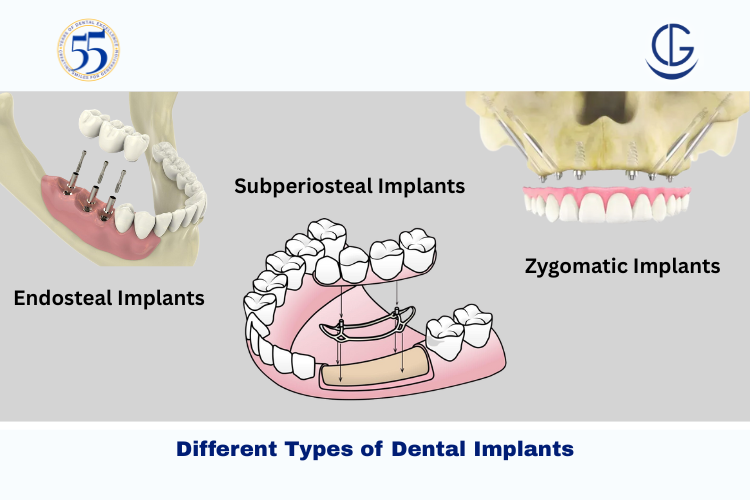Schedule Appointment



Would you like to make your smile last again? With the expert advice of Dr. Gowds Dental Hospital, your go-to clinic for latest dental facilities and tooth replacement options in India, you can learn everything you need to know about the different types of dental implants, materials, benefits, and costs.
Dental implants give patients a chance to replace missing teeth; it has changed the game of missing teeth replacement because dental implants can replace one tooth or multiple teeth and offers a solution that is long lasting and full of function and form for people who have lost a tooth or teeth from injury, decay, or disease.
Dental implants are artificial tooth roots made from biocompatible materials like titanium or zirconia. They are surgically placed into the jawbone to support crowns, bridges, or dentures. Implants fuse with the bone over time—a process called osseointegration—providing a stable and permanent base for replacement teeth.
There are several types of dental implants, and choosing the right one depends on your individual oral health, bone density, and overall treatment goals.
Endosteal implants are the most commonly used type of dental implant. These are typically made from titanium and shaped like small screws. They are surgically placed directly into the jawbone.
Best suited for:
Benefits:
Related Note: If you’re curious about types of dental implants cost, endosteal implants tend to be among the more affordable options, though the price still depends on several factors including the number of teeth being replaced and additional procedures like bone grafting.
Unlike endosteal implants, subperiosteal implants are placed on top of the jawbone but beneath the gum tissue. These implants are used when the patient does not have enough healthy jawbone and does not want to undergo a bone graft.
Best suited for:
Benefits:
However, they are less commonly used today due to the superior outcomes associated with endosteal implants.
Zygomatic implants are a specialized type of dental implant used when there is severe bone loss in the upper jaw. Instead of anchoring into the jawbone, they are anchored in the cheekbone (zygoma).
Best suited for:
Benefits:
Due to the complexity of this procedure, it should only be performed by an experienced implant specialist at facilities like Dr. Gowds Dental Hospital.
Choosing the right material is just as important as selecting the implant type. The types of dental implants materials used directly affect durability, healing, and compatibility with your body.
Titanium is the most widely used implant material due to its biocompatibility and strength.
Pros:
Zirconia is a metal-free ceramic alternative for patients with metal allergies or those seeking a more holistic solution.
Pros:
Both materials offer unique advantages. Your dentist will help determine the best fit based on your oral health and cosmetic goals.
Mini dental implants (MDIs) are smaller in diameter than traditional implants and are often used for stabilizing lower dentures or replacing small teeth.
Best suited for:
Benefits:
Keep in mind that while MDIs are cost-effective, they may not be suitable for all patients or long-term heavy chewing needs.
The All-on-4 treatment concept involves placing four strategically angled implants in the jaw to support a full arch of replacement teeth.
Best suited for:
Benefits:
This method is ideal for patients looking for a comprehensive tooth replacement option without undergoing multiple surgeries.
The types of dental implants cost vary widely based on:
It’s important to have a personalized consultation at a reputed clinic like Dr. Gowds Dental Hospital to understand the best option for your needs and an estimate tailored to your case.
While online research is a great start, only a dental professional can assess your oral health and recommend the best types of dental implants for you. Bone density, gum health, medical history, and budget all play a role in determining the best path forward.
If you’re dealing with advanced tooth loss or have concerns about jawbone deterioration, consult a specialist as soon as possible. Getting a proper evaluation early can help avoid more complex procedures down the road.
Choosing from the many types of dental implants can feel overwhelming, but understanding your options is the first step toward a confident smile. Whether you’re exploring endosteal, subperiosteal, or zygomatic implants, or comparing types of dental implants materials, the right solution is out there for you.
At Dr. Gowds Dental Hospital, our team of experts provides personalized treatment plans to ensure safe, successful outcomes for all types of tooth replacement. We guide you every step of the way, from diagnosis to aftercare.
Remember, the best dental implant choice is one that fits your unique anatomy, lifestyle, and health goals. So don’t wait—schedule a consultation today and take the first step toward restoring your smile for good.
The notable types of dental implants are endosteal, subperiosteal, zygomatic, mini implants, and All-on-4. Each type of implant has a specific use based upon bone structure and dental needs, and your dentist will help determine which is correct for you.
Costs vary, depending on the type of dental implants, the materials used, the number of implants, and any prerequisites of further procedures. The only way to get an accurate estimate, is through a personal consultation at a clinic such as Dr. Gowds Dental Hospital.
The various types of dental implants have common materials such as titanium and zirconia. Titanium is a durable material commonly used by practitioners, while zirconia is metal-free and
the preferred alternative for patients with allergies and/or other cosmetic indications.
All-on-4 implants are one of the most popular implant systems for the full replacement of teeth. All-on-4 provides a retrainable arch of teeth, with 4 implants secured. All-on-4 implants are for patients with multiple missing teeth, or missing teeth with significant bone loss.
Yes, currently mini implants tend to be less complex and cheaper than the different types of dental implants. They offer an alternative means of stabilizing lower dentures or for replacing smaller teeth. They might not be appropriate for chewing forces and durability of those implants for all patients.